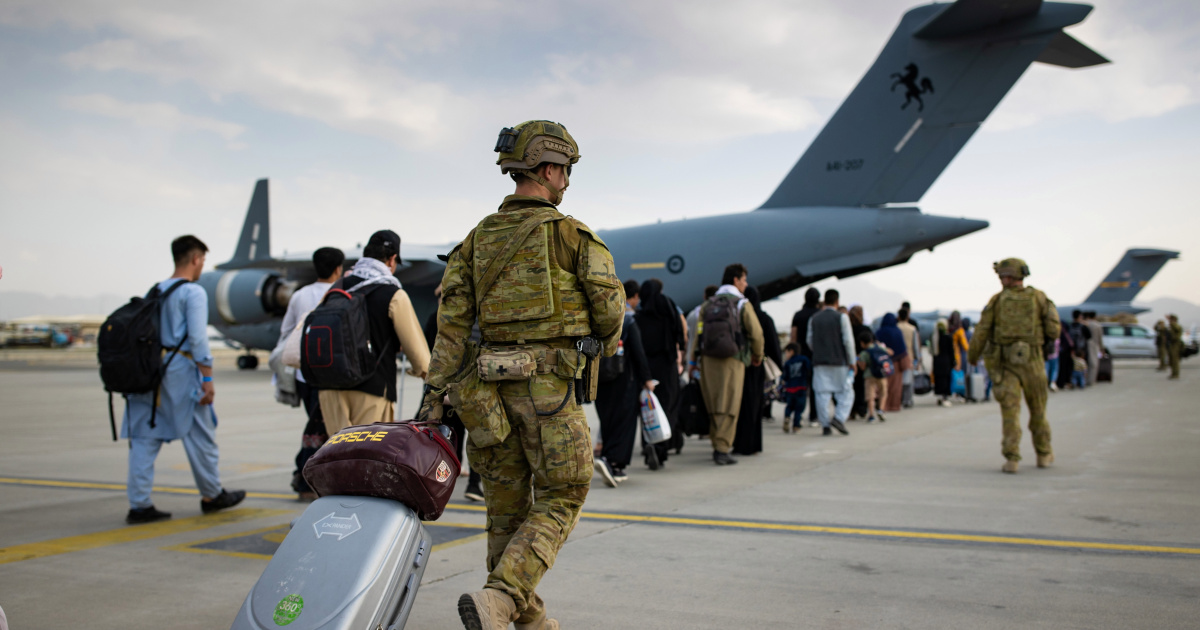An Afghan refugee who has been held in Australian immigration detention for more than eight years is pleading for his release in a bid to return to Taliban-controlled Afghanistan and rescue his family following the withdrawal of US troops on Tuesday.
The refugee, who for his family’s safety can only be identified as FGS20, a pseudonym used in court proceedings, worked alongside coalition forces in Afghanistan after the United States military invaded the country and toppled the Taliban government in 2001.
At the beginning of this month, as the Taliban retook one Afghan city after another, FGS20 filed an application for emergency evacuation visas for his wife and four children.
Then, as the Taliban advanced on the Afghan capital, Kabul, FGS20’s lawyers took the Australian government to court, seeking an urgent decision.
But the government, led by Australian Prime Minister Scott Morrison, said on Wednesday that it would not be able to decide whether to grant the Subclass 203 Emergency Rescue visas before the US withdraws all of its troops from Afghanistan on August 31.
Increasingly desperate, FGS20 said he made a formal request on Thursday to “please” be sent back to Afghanistan “immediately”, stating that he “needs to travel tonight”.
There has been no response from the Australian government, however.
“[The] Australian government wants to kill me in here, in detention,” FGS20 said, referring to desperate thoughts of taking his own life.
“And … the Australian government has given a chance to the Taliban … to kill my family.”
‘We have failed so many people in Afghanistan’
FGS20 fled Afghanistan in 2013 and arrived by boat in Australia, with the aim of seeking asylum in the country with his family.
“I [thought] I [would spend] maybe one month or two months [in] detention,” he said. “After two months, I [would] go to [the] community [and] bring my family to a safe country.”
Instead, he has been held in Australian immigration detention for more than eight years. FGS20 spent the first six years of that time in a notorious offshore detention centre on Papua New Guinea’s Manus Island.
Then in 2019, he was brought to Australia for medical treatment. Since then, he has been held at a range of detention centres and Alternative Places of Detention (APODs) around the country.
During this time, FGS20 said he has lost 15 relatives to the Taliban, including his brother.
“Every time I [heard I’d] lost one of my family,” said FGS20, “I [couldn’t] do anything … nothing.”
Jane Alcorn, an Australian citizen whom FGS20 refers to as his “Australian mum”, said she would never forget the day FGS20 lost his brother.
“I remember when he phoned me, it was in the middle of the day and I was at the shop,” Alcorn said. “I went to sit in the car because I just couldn’t think clearly for a minute … I knew it [was] true, but I couldn’t really believe it … and [FGS20] was so, so sad, you can’t imagine.”
The Taliban, who took control of Kabul on August 15, has offered a general amnesty for former government officials and promised to respect women’s rights and media freedoms. But there are already reports of Taliban fighters targeting people who have worked with the US or NATO forces.
A confidential threat assessment prepared for the United Nations on August 25 said Taliban fighters were going house to house, setting up checkpoints and threatening to arrest or kill relatives of “collaborators” in major cities.
‘Moral obligation’
Refugee lawyer and human rights advocate, Atika Hussain, said Australia has a “moral obligation” to evacuate the family members of Australian citizens and residents with or without a visa.
That obligation extends to FGS20’s family, she said, because the protection he has received as a refugee should morally extend to his immediate family now that the Taliban have taken control, and they are in danger, too.
Australia’s rescue efforts were a failure, she argued, with evacuations starting too late and ending too soon.
“We have failed so many people that are still in Afghanistan,” she says.
Morrison, the prime minister, said the Australian military has evacuated 4,100 people from Kabul, including 3,200 Australians and Afghan nationals with Australian visas.
The Australian airlift ended on Friday, shortly before a member of the ISIL-affiliated Islamic State in the Khorasan Province, ISKP (ISIS-K) detonated his explosives outside the Kabul airport, killing more than 100 Afghan civilians who had been thronging the airfield in a desperate bid to leave the country.
The Human Rights Commission of Australia has “urged the Government to consider expanding Australia’s resettlement programme with a specific Afghan intake”.
The commission recommended the Australian government take in an additional 20,000 Afghan refugees, especially in light of the ISKP attack.
Al Jazeera contacted the Department of Home Affairs and the Australian Border Force for comment on FGS20’s case, but there was no response at the time of publication.
Watching all of this unfold from inside the Park Hotel APOD and helpless to do anything about it, FGS20 said he has been under immense pressure. He now feels there is little hope of rescue for his family.
“My son has asked me if you’re not going to help me, you come back and [we will] die together,” he told Al Jazeera. His son is just 14 years old.
“Before America has left, [the] Australian government must send me back [to Afghanistan],” he added.
After the US withdraws, “it is finished,” he said. “I [won’t] have any family.”
